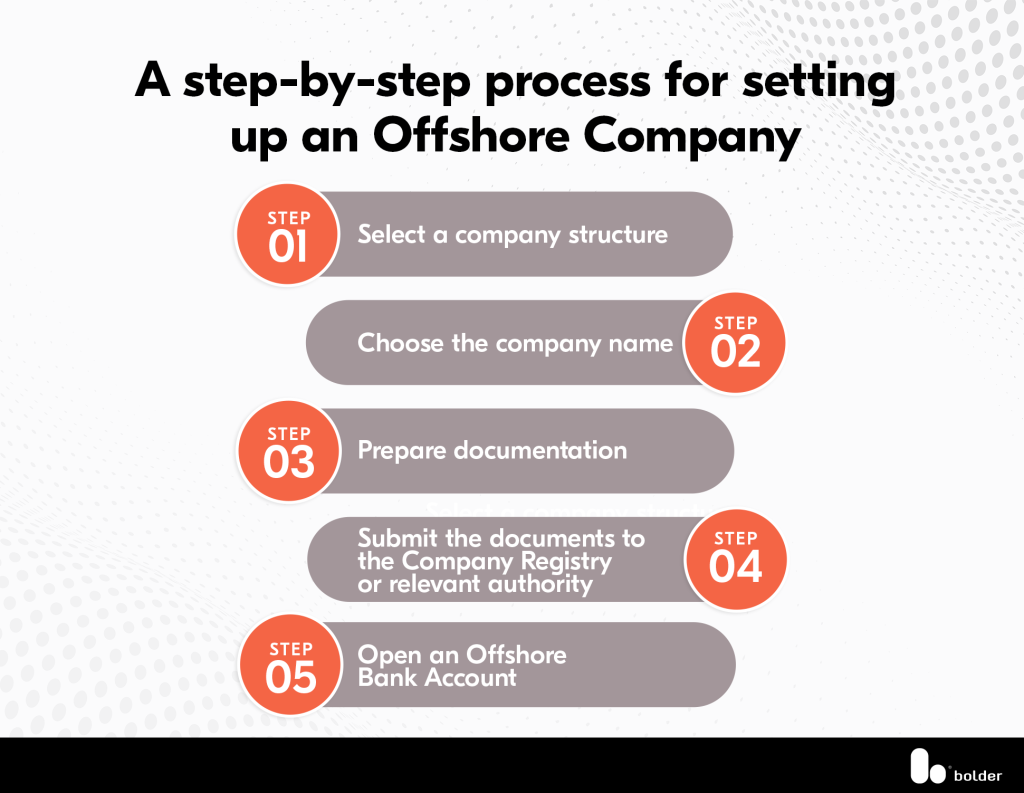Offshore Company Formations Costs Breakdown: What to Budget
Debunking Offshore Firm Formations: Just How They Operate and What to Anticipate
Offshore firm formations can appear facility and enigmatic. Offshore Company Formations. These entities, frequently developed for tax obligation advantages and personal privacy, run under special lawful structures. Business owners may locate themselves maneuvering through a puzzle of laws and compliance needs. Understanding the ins and outs is crucial for success. What are the genuine benefits? What are the prospective mistakes? A closer examination reveals the subtleties that might affect decision-making significantly
Comprehending Offshore Companies: Definitions and Kinds
Offshore firms are entities developed in a jurisdiction outside of a person's or organization's key country of house, typically for purposes associated with tax obligation optimization, possession protection, or regulatory benefits. These firms can take different kinds, including minimal obligation business (LLCs), international business companies (IBCs), and offshore trust funds. Each kind serves certain features and attract different demands.
Limited liability firms supply owners with defense from personal liability, while worldwide organization firms are popular for their flexibility and minimal coverage needs. Offshore trusts, on the other hand, are utilized primarily for estate preparation and property protection.
The option of jurisdiction greatly influences the business's procedures, as some locations use more positive legal frameworks and personal privacy securities. Offshore Company Formations. Comprehending the differences in between these types is crucial for individuals and companies considering overseas structures, as each option lugs various ramifications for administration and conformity
The Advantages of Developing an Offshore Business
Establishing an overseas business can give numerous advantages, especially for those looking for to improve their economic strategies and protect their assets. One significant benefit is tax obligation optimization; many jurisdictions provide favorable tax prices or exceptions, permitting businesses to keep more revenues. Furthermore, offshore firms can provide a layer of privacy, protecting the identifications of owners and investors from public analysis.
Another benefit is asset protection. By placing assets in an overseas entity, people can protect their wealth from potential lawful cases or political instability in their home nations. This framework also promotes worldwide organization operations, allowing easier accessibility to worldwide markets and varied customers.
The establishment of an overseas company can enhance integrity and stature, appealing to customers who value global business practices. In general, these benefits make overseas business formations an eye-catching alternative for businesses and people aiming for economic development and protection.
Key Factors To Consider Before Creating an Offshore Entity
Before forming an overseas entity, several essential elements have to be evaluated. Lawful conformity requirements, tax ramifications and benefits, in addition to jurisdiction option, play a substantial function in the decision-making process. Recognizing these considerations can help companies and people browse the intricacies of overseas company formations efficiently.

Legal Compliance Needs
When taking into consideration the formation of an overseas entity, recognizing lawful compliance needs is necessary to ensure adherence to both international and local regulations. Potential local business owner should familiarize themselves with policies regulating business registration, reporting commitments, and operational standards in the selected territory. This includes validating the legal needs for shareholders and supervisors, as well as making certain compliance with anti-money laundering (AML) and know-your-customer (KYC) laws. Furthermore, organizations should remain familiar with any licensing demands particular to their sector. Engaging local legal and economists can provide valuable understandings, making certain that all essential documents is prepared and sent properly. Eventually, thorough understanding of legal conformity aids mitigate risks and promotes a lasting offshore procedure.
Tax Implications and Benefits
Many company owner think about the tax ramifications and benefits of forming an overseas entity as a critical consider their decision-making procedure. Offshore companies can offer significant tax obligation benefits, such as decreased corporate tax obligation prices, exception from certain regional tax obligations, and the capacity to postpone taxes on foreign revenue. These advantages can lead to improved productivity and capital, making offshore frameworks appealing for international company operations. Additionally, the potential for tax obligation treaties might even more decrease tax obligation liabilities. It is vital for company owners to comprehend the intricacies involved, consisting of conformity with both global and regional tax obligation policies. Involving with tax obligation professionals is suggested to navigate these ins and outs properly and guarantee ideal tax preparation methods.
Territory Choice Elements
What variables should one think about when choosing a jurisdiction for overseas company formation? Key factors to consider include tax obligation efficiency, regulative environment, and political security. Territories with positive tax regimens can considerably influence earnings. The regulative landscape must use versatility and convenience of conformity, permitting effective organization operations. Political security is crucial, as it ensures the safety of assets and connection of operations. Furthermore, the credibility of the territory can influence customer depend on and business connections. Accessibility to banking solutions and the schedule of specialist assistance solutions are likewise vital. Finally, understanding neighborhood regulations pertaining to possession, personal privacy, and reporting demands is vital to establish that the overseas entity straightens with business proprietor's objectives and lawful obligations.
The Refine of Establishing an Offshore Business
Establishing an offshore business involves a collection of tactical steps that require cautious planning and compliance with international regulations. At first, a private must choose an appropriate territory that aligns with their company purposes and supplies desirable tax obligation benefits. Adhering to jurisdiction choice, the following action is to choose an one-of-a-kind firm name and prepare the required documents, consisting of short articles of unification and shareholder arrangements.
As soon as the documentation is prepared, it has to be submitted to the appropriate authorities together with the needed fees. After approval, the company will get a certificate of consolidation, formally establishing its legal presence. The individual should after that open a corporate savings account to facilitate economic purchases.
Maintaining an offshore business entails sticking to ongoing compliance demands, such as yearly reporting and tax responsibilities, which differ by jurisdiction. Recognizing each action is essential for a successful offshore firm formation.

Legal and Governing Framework for Offshore Business
While establishing an overseas firm can supply considerable advantages, it is vital to maneuver through the complicated legal and regulative framework that regulates such entities. Each territory has its own collection of legislations that determine whatever from company formation to tax and conformity needs. These guidelines are made to protect against prohibited activities, such as money laundering and tax obligation evasion, and often need extensive documents and transparency.
Crucial element of this structure include the necessity of designating local supervisors, preserving a registered workplace, and adhering to yearly coverage responsibilities. Additionally, several jurisdictions impose details licensing requirements for specific service activities. Understanding these legal specifications is crucial for making sure conformity and mitigating threats connected with charges or lawful disagreements. Subsequently, engaging with legal specialists that focus on offshore business can assist in navigating navigate here with this intricate landscape, ultimately promoting a certified and successful offshore company procedure.
Usual Mistaken Beliefs Regarding Offshore Business
Many individuals hold misconceptions regarding offshore business, often corresponding them with tax evasion and prohibited tasks. Nonetheless, it is very important to identify that these entities can run legitimately within a framework created for reputable business practices. Clearing up the legal condition of overseas business can assist eliminate these myths and promote a more accurate understanding of their purpose.
Tax Evasion Myths
In spite of the growing appeal of offshore companies, misunderstandings about their usage for tax obligation evasion linger. Many individuals wrongly believe that establishing an offshore entity is exclusively a way to stay clear of tax obligations. Nonetheless, overseas firms are frequently utilized for legitimate objectives, such as property security, international business growth, and investment diversity. The assumption that all overseas activities relate to illicit tax obligation evasion neglects the complexities of global tax obligation laws and compliance needs. In addition, the huge bulk of offshore territories have applied procedures to combat tax obligation evasion, advertising transparency and details exchange. This mischaracterization can deter legitimate organizations and financiers from discovering the possible benefits of offshore business formations while continuing an adverse preconception surrounding these entities.
Legal Condition Clarified
The lawful condition of overseas companies is typically misunderstood, bring about a selection of misconceptions. Many believe these entities operate in a legal gray area, assuming they are dishonest or naturally unlawful. Actually, offshore firms are legit organizations formed under the legislations of specific territories, made for numerous factors, consisting of possession security and market expansion. One more usual mistaken belief is that offshore firms escape taxes totally; nevertheless, they are subject to the guidelines and tax obligation commitments of their home nations. Furthermore, some people believe that offshore business can be easily manipulated for cash laundering or illegal activities. While misuse can happen, most jurisdictions implement rigorous a knockout post compliance and openness regulations to reduce such dangers, making sure that overseas business operate within legal structures.

Managing and Running Your Offshore Company Efficiently
Properly managing and operating an overseas company requires a calculated method that stabilizes conformity with regional guidelines and the search of business goals. Effective offshore management entails understanding the jurisdiction's tax regulations, reporting requirements, and operational guidelines. Using local professionals, such as accountants and lawful consultants, can provide vital understandings into passing through these complexities.
Furthermore, establishing clear interaction networks and functional methods is vital for maintaining efficiency. Utilizing technology for project management and collaboration can enhance efficiency, while regular performance reviews guarantee alignment with strategic purposes.
Maintaining durable monetary records is necessary, as openness promotes trust fund with stakeholders and complies with global requirements. Being adaptable to modifications in legislation or market problems enables offshore firms to pivot successfully, guaranteeing lasting sustainability and development. By adhering to these concepts, entrepreneur can maximize the advantages of their offshore endeavors while mitigating dangers.
Frequently Asked Inquiries
Exactly how Much Does It Price to Preserve an Offshore Firm Every Year?
The price to preserve an overseas company every year varies substantially, normally ranging from $1,000 to $5,000, relying on jurisdiction, solutions required, and compliance commitments. It is important to consider additional charges for particular needs.
Can I Open Up a Financial Institution Account for My Offshore Firm Remotely?
Opening up a checking account for an offshore business from another location is normally feasible. Nonetheless, needs may vary by jurisdiction, typically demanding documentation and verification processes, which can complicate the remote application experience for people.
Exist Details Nations Known for Easier Offshore Company Formations?
Certain countries, such as Belize, Seychelles, and the British Virgin Islands, are renowned for their streamlined procedures and desirable policies regarding overseas firm formations, attracting entrepreneurs seeking efficiency and discretion in organization procedures.
What Kinds of Companies Are Best Suited for Offshore Firms?
Specific services, such as working as a consultant, e-commerce, and financial investment companies, commonly benefit from offshore firms because of tax advantages, privacy, and regulative versatility - Offshore Company Formations. These entities usually thrive in territories that promote desirable service settings
How Can I Ensure Conformity With Regional Regulations When Operating Offshore?
To assure compliance with regional regulations when running offshore, it is necessary to engage lawful experts, carry out detailed research study on territory policies, and preserve transparent financial records, therefore decreasing dangers connected with non-compliance.
